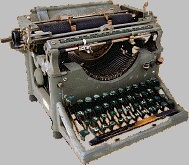“…bashing away on a battered old upright Imperial…” (Loseable Paradises)
“That’s the trouble with following Joyce: his experiments were meant for himself and himself only.” As you’ll see from the previous post, that warning came from Anthony Burgess, commenting on the unpublished novella Loseable Paradises which I’d had the cheek to send to him at the beginning of 1990. Burgess was of course an expert on Joyce, and knew how easy it was for a young or aspiring author (especially one, like him, fascinated by music) to be seduced by the joy of wordplay, and to forget that there is more to writing a novel than producing streams (even riverruns) of Finnegans Wake parody.
Loseable Paradises was in fact an attempt to re-work and novelize ideas from a couple of plays- Wordplay and Little Victims – which I’d written for my drama students at Gosford Hill School in Kidlington in 1988/89. I seem to remember producing Macbeth and The House of Bernada Alba there during the same academic year- no lack of energy in those days!
But here’s the danger. It’s fatally easy to get away with self indulgence and facile solutions in writing school drama: it’s all so new to the pupils, and (if you’re lucky) they’ll be enjoying themselves too much to worry what on earth it’s all about, anyway! Some of the parents aren’t so easily fooled, though. I remember the parent of one very bright American boy muttering darkly about all the “psychobabble” in Wordplay, and he was right to be critical. What was it all about? Abstraction is all very well, and, as I said before, it’s OK to expect a little creativity from your audience: but they need to take a better experience away from the show than a vague sense of having been confused and bewildered!
I have to confess I was pretty bewildered by my ideas myself, which is one reason why music theatre was a better medium at the time than the printed page. I needed a framing, or possibly distancing device. With my composer’s hat on, I was able to achieve a perspective which gave the audience a lot more to hang on to than the words alone. Wordplay was in twelve scenes with music, each centred around one note of the twelve-note tone row from which all the musical material was derived. Fumbling along now in the shadow of Stockhausen as much as Joyce, in these twelve scenes I attempted a kind of “moment form”, so that all aspects of performance were contained in every scene, but the emphasis was varied: there was pure acting, a dance, a “little lost trumpet concerto”, and so on. The rhythms of music theatre, with its strict characterisation of time, could make up for the text’s incoherence by imposing an order of its own.
Looking back, I was incredibly lucky to have such willing students in a school which was prepared to indulge me in such experimentation! I’ll write about Little Victims and how Loseable Paradises finally emerged next time. There are connections with my new Kindle e-book Tristan and the Dragon Girl to be examined too!
